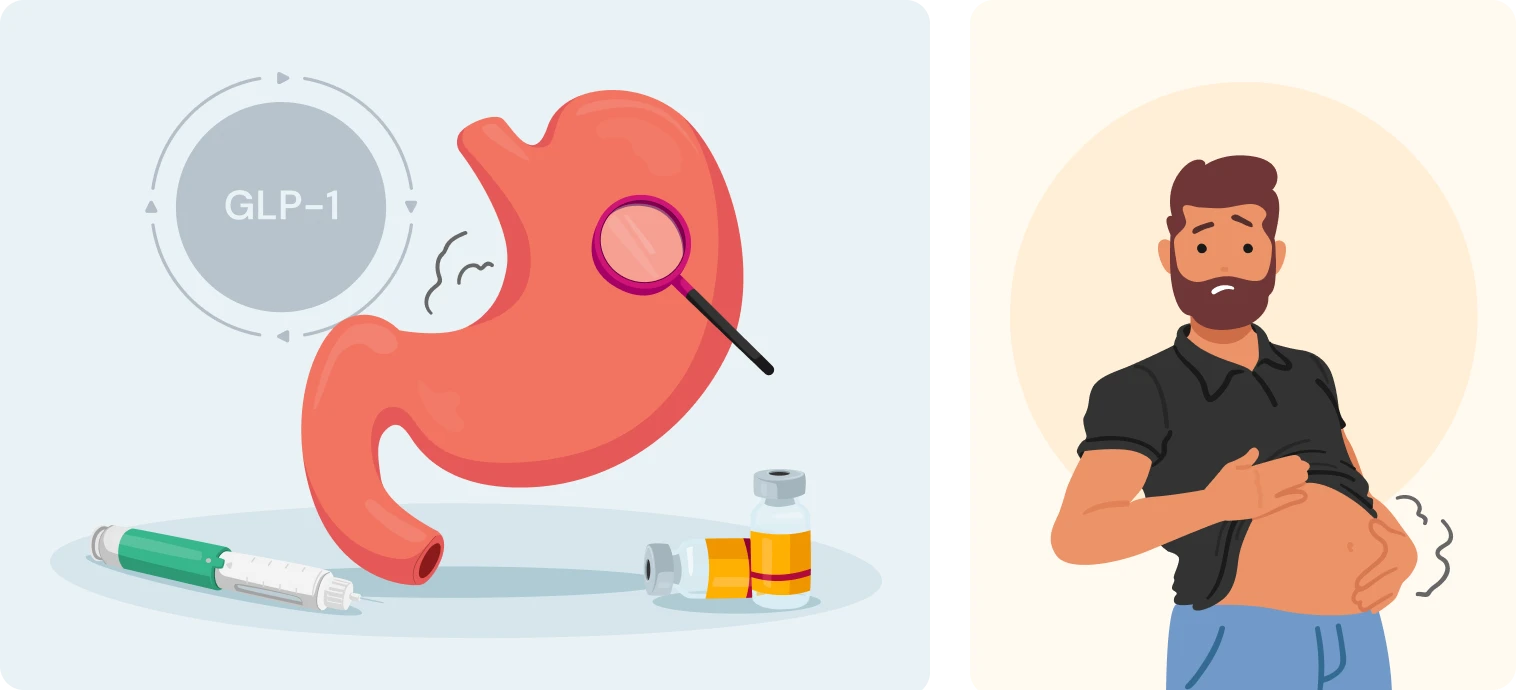Bloating is one of the most common side effects of GLP-1 injection treatments, including semaglutide (Wegovy) and tirzepatide (Mounjaro). These medicines help with weight management by slowing down the rate at which food leaves the stomach, a process called delayed gastric emptying. While effective for appetite control, this can also lead to trapped wind, abdominal swelling, and stomach discomfort, particularly in the first weeks of treatment. The good news is that bloating from GLP-1 injections is usually temporary, and most patients find that their symptoms improve as their body adjusts to the medication. With the right dietary adjustments, lifestyle modifications, and medical support, bloating can be effectively managed.

Common symptoms
Bloating related to GLP-1 treatment can present in several ways. Patients may notice physical changes, such as abdominal swelling, as well as sensations of discomfort or fullness. The following are the most frequently reported symptoms. Severity and combination of symptoms can vary widely between individuals, and may also fluctuate over the course of treatment.
- Abdominal distension or visible swelling
- Feeling uncomfortably full even after small meals
- Increased gas or flatulence
- Stomach discomfort or pressure
- Gurgling or rumbling sounds in the abdomen
How common is bloating with GLP-1 treatments?
Bloating varies by person, but studies show that about 40-70% of GLP-1-treated patients experience some form of gastrointestinal side effects, including nausea & vomiting, diarrhoea, constipation and abdominal pain. It is most common during the initial weeks of treatment and when dosages are increased. Most people’s symptoms improve after a few weeks as the body adjusts.
Managing bloating on GLP-1 treatments
In most cases, bloating caused by GLP-1 can be effectively managed through a combination of dietary modifications, lifestyle changes, and appropriate medical support. The following guidance outlines practical strategies to help reduce symptoms and improve tolerance of treatment.
Dietary adjustments
- Eat smaller, more frequent meals rather than three large meals
- Chew food thoroughly to aid digestion
- Limit carbonated beverages, which can introduce more gas into your digestive system
- Stay well-hydrated, but avoid drinking large volumes with meals
- Include lean proteins and low-starch vegetables, which are generally easier to tolerate
Lifestyle tips
- Take gentle walks after meals to encourage digestion
- Practise mindful eating by eating slowly and without distractions
- Maintain good posture whilst eating to reduce pressure on your stomach
- Keep a food diary to identify specific triggers for your bloating
Medical support
- Follow the prescribed dosing schedule carefully, as rapid dose increases may worsen bloating. Discuss with your clinician about temporarily slowing dose escalation if bloating is severe.
- Medications such as Gaviscon double-action, Wind-Setler, containing dimeticone, and Alka-Seltzer, may provide relief for some individuals.
- Over-the-counter simethicone preparations may also be considered if advised by your doctor.
- Peppermint tea or peppermint oil capsules may also help relax the gut and reduce bloating.
When to seek medical advice
Mild bloating is expected for many patients starting GLP-1 treatment and often settles with time. However, it is important to recognise when symptoms may indicate something more serious. You should contact your healthcare provider promptly if you experience any of the following:
- Severe or worsening abdominal pain
- Bloating that does not improve after 2-3 weeks
- Significant distress or interference with daily activities
- Signs of dehydration, such as dizziness, dark urine, or reduced urination
- Signs of a possible allergic reaction (rash, swelling of face/throat, difficulty breathing)
- Bloating accompanied by persistent vomiting or inability to keep fluids down
Long-term outlook
The majority of patients find that bloating eases within 4–8 weeks as their bodies get used to the medication. In the meantime, small changes to your routine can make a big difference in comfort and quality of life.
FAQs
Why do GLP-1 injections cause bloating?
GLP-1 medicines slow digestion to help you feel fuller for longer. This delayed stomach emptying can increase gas build-up and abdominal pressure, leading to bloating.
How long does bloating last on GLP-1 treatments?
Bloating is often most noticeable in the first few weeks or after a dose increase. Symptoms usually improve as the body adjusts, typically within 2–6 weeks.
What helps bloating on semaglutide or tirzepatide?
Eating smaller meals, avoiding fizzy drinks, walking after meals, and drinking enough water often help. Your clinician may also suggest adjusting your dose or using over-the-counter remedies.
Is bloating from GLP-1 injections serious?
Most bloating is mild and temporary. Seek medical advice if you have sudden or severe abdominal pain, persistent vomiting, or signs of dehydration.
Should I stop taking my medication if I experience bloating?
No. Do not stop GLP-1 treatment without medical guidance. In most cases, symptoms can be managed with simple strategies or temporary dose adjustments.
Is bloating worse with higher doses?
Yes, it may increase during dose escalation, which is why GLP-1 medicines are introduced gradually.
Can probiotics help with GLP-1-related bloating?
Some patients report improvement with probiotic supplements, though clinical evidence is limited. Consult your healthcare provider before starting any supplements.





























